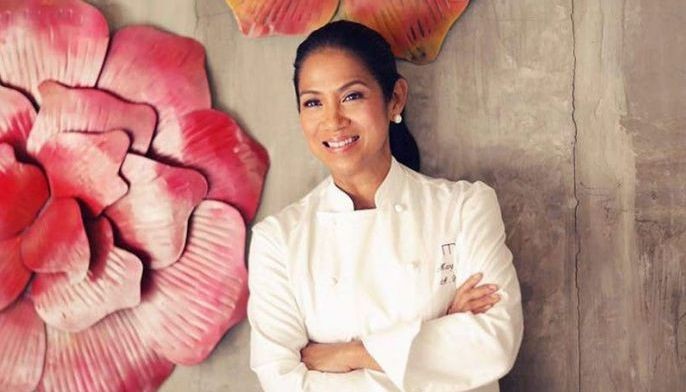Reviving ancestry and respect for produce at Madrid Fusión 2016

MADRID, SPAIN — This year’s Madrid Fusion held at the Palacio Municipal de Congresos had a recurrent topic among several of the chef-speakers: reviving ancestry and respect for produce.
Latin America’s top chefs Virgilio Martinez (Central, Peru), Mauro Colagreco (Mirazur, France) and Jorge Vallejo (Quintonil, Mexico) opened their session with a live “traditional kitchen fire” onstage — the way their ancestors cooked back in the day. They had banded together to form Origenes (Origins) to honor their Latin American ancestry (Colagreco is Argentinean) and to revive the ingredients and prehistoric cooking techniques of their land by traveling around the continent and working with farmers and suppliers, using their knowledge to create traceability.
“We are trying to recover the traditional gastronomy of our communities and bring back a very human concept and relationship in cuisine, and keep these elements alive,” said Vallejo.
Josean Alija talked about going back to basics at his Nerua at the Guggenheim Museum in Bilbao, where he is known for painstakingly putting vegetables from his immediate natural environment center-stage. “There are no shortcuts for excellence,” he declared.
Our very own Chele Gonzalez — the only Philippine-based chef who presented this year (introduced by no less than his mentor, Mugaritz’s Andoni Aduriz) spoke about his travels around the country and how he incorporated cooking techniques from the Aetas into the dishes he serves at Gallery Vask.
David Thompson declared that the most important “equipment” at his Nahm in Thailand was his mortar and pestle. “We make everything by hand,” he said.
No more real restaurant template
A conversation with the American avant-garde Daniel Humm (Eleven Madison Park, New York) and Grant Achatz (Alinea, Chicago) also touched on an important reality for restaurateurs and chefs today. “Restaurants today have multiple personalities; they can evolve,” said Achatz. “Before, every time you return [to a restaurant], it had to be the same. Now people want the opposite, they want a different experience. That’s where fine dining is going… you take the risk and adapt to what people want.”
Humm agreed: “For a young chef, coming out to find himself on his own and is wondering which way to go… there is no one right way anymore; there are now so many ways. There isn’t even a real recipe anymore.”
Coming soon…to the Philippines
And for Filipinos, something to look forward to is the upcoming Madrid Fusion Manila 2016, organized by the Philippines’ Department of Tourism (DOT) and Spain’s Foro de Debate, S.L. and Arum Estrategias Internacionalización (Arum), which will take place at the SMX Convention Center from April 7 to 9. Philippine STAR sat and spoke with some of the chefs on what they are looking forward to during their visit, and what they will be speaking about:
Joan Roca (El Celler de Can Roca, Girona, Spain)
(#1 Restaurant in the World- World’s 50 Best Restaurants; 3 Michelin Stars)
“I hope to taste Filipino food. And spend some time with the Filipino people.”
Virgilio Martinez (Central, Lima, Peru)
(#1 Restaurant in Latin America; #4 Restaurant in the World- World’s 50 Best Restaurants)
“[In Manila], I will be speaking about the next menus we are conceptualizing on altitudes. The menu will be based on the ecosystem, each course representing an altitude. We will be mixing biodiversity in terms of the Amazon meeting the Andes meeting the Coast. I will bring some images and make the people taste what I am doing; it’s part of bringing what I do in Peru. Then, it is important [to share] that we are not using anything coming from a source that we do not know. We do not use sugar anymore. If we want to sweeten something, we make some infusions or dry some fruits; so we obtain all the sweetness from the herbs like stevia. We do our own umami and play with it. Everything has to be natural; we have this huge challenge of having 100-percent-traceability for our restaurant — a concept we are doing that can be replicated anywhere in the world — and make an impact.”
Jorge Vallejo (Quintonil, Mexico City, Mexico)
(#6 Restaurant in Latin America; #35 Restaurant in the World- World’s 50 Best Restaurants)
“For me, it’s going to be interesting to speak about the trades of the spices. We have a lot of similarities in the kitchen [with Mexico and the Philippines] with the tamales and adobo. I used to work in a cruise ship a long time ago and I made friends with Filipinos. I know the flavors of sabaw, adobo, so it’s something I want to share. I do some adobo also in Mexico and I want to put into context what’s adobo for us and what’s adobo for you.”
David Thompson (Nahm, Bangkok, Thailand)
(#7 Best Restaurant in Asia; #22 Best Restaurant in the World- World’s 50 Best Restaurants)
“I look forward to learning more about Philippine street food. And hopefully to see more outside Manila.”
* * *
You can reach me at inbetweendeadlines@gmail.com, on my blog www.cheryltiu.com, on Twitter at www.twitter.com/cheryltiu or on Instagram at www.instagram.com/chertiu.



















